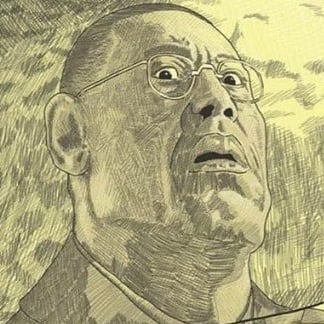The picture below shows Zejneba Hardaga guiding a Jewish woman (Rivka Kavillo) and her children down a street in Sarajevo in 1941. As they walk, Zejneba covers Rivka’s yellow star with her veil. The Hardagas let the Kavillos (including their children and Rivka’s husband, Josef) stay in their home until Josef was able to get his wife to an area where they were relatively safe. Afterward, they continued to hide Josef despite the fact that Gestapo headquarters were nearby, and despite the fact that the town was plastered with signs warning that anyone caught housing a Jew would be killed. Josef eventually joined his wife and children, and they all survived the war.
I love this story, and I also love context, so I just need to add to this. The story behind the photo is from the Yad Vashem testimony of Josef Kabiljo (husband of Rifka, the pictured Jewish lady). (They spell their names differently everywhere because Hebrew is possibly the worst language for Balkans language transcription except maybe Chinese). It is very much worth reading, it involves multiple concentration camps, and much more nuance than just “German Nazis vs Jewish people”.
From the testimony, after the Hardaga’s took in the Kabiljo family:
“Our home is your home”, [Mustafa Hardaga] said, and to demonstrate this point, the women were not obliged to cover their faces in the presence of Josef Kavilio, since he was now a member of the family.
This was an insanely dangerous thing for them to do. There were posters lining the streets warning people that the penalty for harboring communist Partisans and Jews was death.
This time, he stayed with them for two months, hidden, without ever leaving their home. Through the windows, Kabilio watched Jews being deported, or being maltreated in the Gestapo building opposite before being flung off it from the third floor and onto the street. Before long, there was not a single Jew left in the city. Kabilio felt that he could stay with his friends no longer – it was simply too dangerous for those harboring him. Thus, with their help, Kabilio managed to move to the Italian occupied zone, where he found his family and joined the partisans.
- Yad Vashem documentation with extra photosZejneba Hardaga, the pictured Muslim lady, her father was later also murdered for harboring Jews. Josef, her husband, spent time in Jasenovac, the third largest concentration camp, which was run by the Croatian Catholic Ustaše who were the Nazi-puppet state running the area. Even the Nazis considered the Ustaše barbaric and inhumane.
Increased activity of the bands [of rebels] is chiefly due to atrocities carried out by Ustaše units in Croatia against the Orthodox population. The Ustaše committed their deeds in a bestial manner not only against males of conscript age, but especially against helpless old people, women and children. The number of the Orthodox that the Ustaše have massacred and sadistically tortured to death is about three hundred thousand. - Heinrich Himmler in a 1942 Gestapo report
For ‘reasons’ the fascist Catholic Ustaše are rarely mentioned, despite being the main axis forces in the area who targeted Orthodox Christians as much as Jewish people. The communist Partisan partnership with the Allies is also rarely mentioned, despite being the main anti-Nazi military forces there too.
A lot of the Yad Vashem testimonies are worth reading though, even if it is Jewish-focussed and WW2 in the Mediterranean was much much more complex than that.
The story of the Partisans fascinates me and how they went from being a tiny force to an army that had freed most of their country by the time they linked up with the Red Army. It’s why I do living history displays about them since the war’s largest resistance movement deserves more mention than just a passing mention in western-centric historical narratives. It has been received very positively, so far since re-enactors re-tread popular history all too often, but that seems to be changing for the better in the UK.
Based





